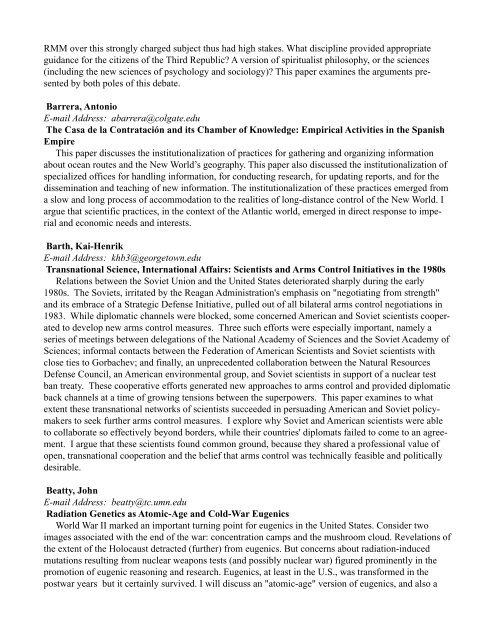Listing of Sessions and Abstracts of Papers - History of Science ...
Listing of Sessions and Abstracts of Papers - History of Science ...
Listing of Sessions and Abstracts of Papers - History of Science ...
You also want an ePaper? Increase the reach of your titles
YUMPU automatically turns print PDFs into web optimized ePapers that Google loves.
RMM over this strongly charged subject thus had high stakes. What discipline provided appropriate<br />
guidance for the citizens <strong>of</strong> the Third Republic? A version <strong>of</strong> spiritualist philosophy, or the sciences<br />
(including the new sciences <strong>of</strong> psychology <strong>and</strong> sociology)? This paper examines the arguments presented<br />
by both poles <strong>of</strong> this debate.<br />
Barrera, Antonio<br />
E-mail Address: abarrera@colgate.edu<br />
The Casa de la Contratación <strong>and</strong> its Chamber <strong>of</strong> Knowledge: Empirical Activities in the Spanish<br />
Empire<br />
This paper discusses the institutionalization <strong>of</strong> practices for gathering <strong>and</strong> organizing information<br />
about ocean routes <strong>and</strong> the New World’s geography. This paper also discussed the institutionalization <strong>of</strong><br />
specialized <strong>of</strong>fices for h<strong>and</strong>ling information, for conducting research, for updating reports, <strong>and</strong> for the<br />
dissemination <strong>and</strong> teaching <strong>of</strong> new information. The institutionalization <strong>of</strong> these practices emerged from<br />
a slow <strong>and</strong> long process <strong>of</strong> accommodation to the realities <strong>of</strong> long-distance control <strong>of</strong> the New World. I<br />
argue that scientific practices, in the context <strong>of</strong> the Atlantic world, emerged in direct response to imperial<br />
<strong>and</strong> economic needs <strong>and</strong> interests.<br />
Barth, Kai-Henrik<br />
E-mail Address: khb3@georgetown.edu<br />
Transnational <strong>Science</strong>, International Affairs: Scientists <strong>and</strong> Arms Control Initiatives in the 1980s<br />
Relations between the Soviet Union <strong>and</strong> the United States deteriorated sharply during the early<br />
1980s. The Soviets, irritated by the Reagan Administration's emphasis on "negotiating from strength"<br />
<strong>and</strong> its embrace <strong>of</strong> a Strategic Defense Initiative, pulled out <strong>of</strong> all bilateral arms control negotiations in<br />
1983. While diplomatic channels were blocked, some concerned American <strong>and</strong> Soviet scientists cooperated<br />
to develop new arms control measures. Three such efforts were especially important, namely a<br />
series <strong>of</strong> meetings between delegations <strong>of</strong> the National Academy <strong>of</strong> <strong>Science</strong>s <strong>and</strong> the Soviet Academy <strong>of</strong><br />
<strong>Science</strong>s; informal contacts between the Federation <strong>of</strong> American Scientists <strong>and</strong> Soviet scientists with<br />
close ties to Gorbachev; <strong>and</strong> finally, an unprecedented collaboration between the Natural Resources<br />
Defense Council, an American environmental group, <strong>and</strong> Soviet scientists in support <strong>of</strong> a nuclear test<br />
ban treaty. These cooperative efforts generated new approaches to arms control <strong>and</strong> provided diplomatic<br />
back channels at a time <strong>of</strong> growing tensions between the superpowers. This paper examines to what<br />
extent these transnational networks <strong>of</strong> scientists succeeded in persuading American <strong>and</strong> Soviet policymakers<br />
to seek further arms control measures. I explore why Soviet <strong>and</strong> American scientists were able<br />
to collaborate so effectively beyond borders, while their countries' diplomats failed to come to an agreement.<br />
I argue that these scientists found common ground, because they shared a pr<strong>of</strong>essional value <strong>of</strong><br />
open, transnational cooperation <strong>and</strong> the belief that arms control was technically feasible <strong>and</strong> politically<br />
desirable.<br />
Beatty, John<br />
E-mail Address: beatty@tc.umn.edu<br />
Radiation Genetics as Atomic-Age <strong>and</strong> Cold-War Eugenics<br />
World War II marked an important turning point for eugenics in the United States. Consider two<br />
images associated with the end <strong>of</strong> the war: concentration camps <strong>and</strong> the mushroom cloud. Revelations <strong>of</strong><br />
the extent <strong>of</strong> the Holocaust detracted (further) from eugenics. But concerns about radiation-induced<br />
mutations resulting from nuclear weapons tests (<strong>and</strong> possibly nuclear war) figured prominently in the<br />
promotion <strong>of</strong> eugenic reasoning <strong>and</strong> research. Eugenics, at least in the U.S., was transformed in the<br />
postwar years but it certainly survived. I will discuss an "atomic-age" version <strong>of</strong> eugenics, <strong>and</strong> also a
















